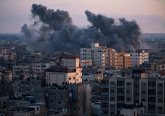While again hundred thousands of Egyptians show their defiance of the old regime at Cairo’s Tahrir Square and worker protests have broken out in several Egyptian cities, Washington and London still follow a pipe dream of a gradual transition from Hosni Mubarak to a more or less democratic, yet by all means secular new government. However, the web of Western diplomatic moves might turn into a Gordian knot as Egypt 2011 shows analogies to Tehran in 1978.
Nations resemble Tolstoy’s families: every one is unhappy in its own way. And yet, when people’s harm escalates and they take matters in their own hands, the differences fade and clear patterns emerge. One such pattern stipulates that revolutions are rarely isolated instances but come in waves, while another points to social and economic inequalities as root causes for violent upheavals. However, the most interesting pattern in the case of Egypt is a procedural one: For revolutions to succeed polarized elites have to connect with a popular resistance movement, usually the urban work force. While temporarily united in their battle to oust the old regime, revolutionary coalitions frequently break after reaching their goal and being in reach of power. It is in the battle for power at the later stage where the outcomes of revolutions are largely determined.
Egypt’s protest coalition is no exception as it is multi-layered including Nobel Peace laureate Mohamed ElBaradei, Ayman Nour and, of course, the Muslim Brotherhood as well as a broad movement of a disenchanted and predominantly jobless youth. And while the brotherhood is currently backing ElBaradei, it is difficult to find convincing reasons why the most potent and best organized opposition group is going to defer to ElBaradei in a transition government and who would hold it back at a national election. The Brotherhood has a great mobilization potential through its various formal and informal networks, a source of organizational power not readily visible on the first glance. Yet, the longer the West tries to back Mubarak to manage an orderly transition and to avoid an immediate election in which the Islamists come out as dominant force, the more it spins itself a Gordian knot that may prove impossible to cut in the future.
It is in this regard that the Egyptian protests strikingly resemble the Iranian uprising against Reza Shah Pahlavi in 1978. Despite the belief that the Islamic Revolution in Iran was a short, violent and straight forward affair in January and February 1979 in which the shah’s ouster was preceded by Ayatollah Khomeini’s reign, a closer look into history reveals close similarities to the current situation on the Nile today. What started as pointed and limited protests by a small fraction of Islamists in the fall of 1977 turned over the course of the year 1978 into increasingly widespread and violent protests similar to those we have seen in Cairo’s Tahrir Square in the last ten days. By June 1978 the Shah had offered major concessions toward the moderate clergy including free elections in the following year; a move Mubarak has obviously taken from Pahlavi’s playbook. And yet, despite the backing of the United States the steadily increasing pressure forced the shah to flee the country in January 1979 as the former opposition leader Shapour Bakhtiar, previously appointed prime minister, took over the government. However, he proved powerless against the popular forces ignited by the return of Khomeini and was ousted by the latter within ten days in February 1979.
The longer the White House and Downing Street back Mubarak and negotiate behind closed doors in order to engineer a slow transition, which might impede the Muslim Brotherhood from immediately taking power through the ballot box, the more it antagonizes the protesters throughout all of Egypt and drives them toward the Islamists. Hardly anyone assumes that the uprising at the Nile will become as violent and fanatic as it turned out in Persia 23 years ago. And yet, the mechanisms of power and change function in the same way. It seems that neither Washington nor London has bothered to learn the lessons from Tehran in 1978 and to apply them to the present uprising in Cairo.
Mark T. Fliegauf is a PhD candidate in International Studies at the University of Cambridge and currently Academic Visitor at the University of Oxford.







1 Comment
We are completely different from any previous experience or later…